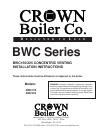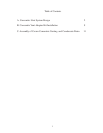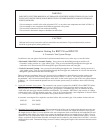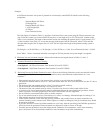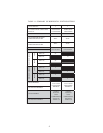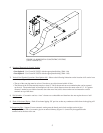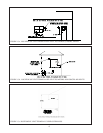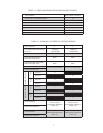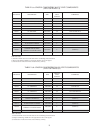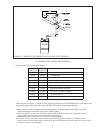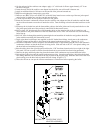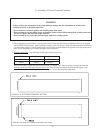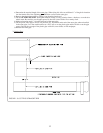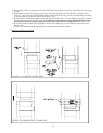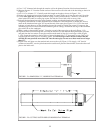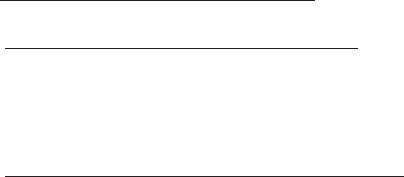
3
Example:
A 80/125mm concentric vent system is planned for a horizontally vented BWC150 which has the following
components:
Standard Radius 90° Elbow
5ft Straight Pipe
Standard Radius 90° Elbow
1-1/2ft Straight Pipe
45° Elbow
Uncut Terminal Section
The Vent Option #3 column in Table 1.1 describes a horizontal direct vent system using 80/125mm concentric vent
pipe. From this column, we see that a BWC150 may have a vent length of up to 55ft The fi rst 90° standard radius
elbow is not considered. The length of the terminal section (not including the terminal itself) is approximately 22.1”
(1.84ft) installed. From Table 1.4, we see that the equivalent length of the 80/125mm 90° elbow is 8.5ft and that
the equivalent length of the 45 degree elbow is 3.0ft. The total equivalent length of the planned venting system is
therefore:
5ft (Straight ) + 8.5ft (90 Elbow) + 1.5ft (Straight ) + 3.0ft (45 Elbow) + 1.84ft (Uncut Terminal Section) = 19.84ft.
Since Table 1.1 shows a maximum allowable vent length of 55ft, the planned vent system length is acceptable.
3) Minimum Vent and Air Intake Lengths - Observe the minimum vent lengths shown in Tables 1.1 and 1.5.
4) Permitted Terminals for Horizontal Venting:
• Vent Option 3 - 80/125mm Concentric Vent Terminal (Crown PN 230531)
• Vent Option 4 - 100/150mm Concentric Vent Terminal (Crown PN 230569)
5) Horizontal Vent and Air Intake Terminal Location - Observe the following limitations on the vent terminal location
(also see Figure 1.3). When locating a concentric terminal, observe the limitations outlined below for “vent
terminals”.
• Vent terminal must be at least 1 foot from any door, window, or gravity inlet into the building.
• The bottom of terminal must be at least 12” above the normal snow line. In no case should it be less than 12” above
grade level.
• The bottom of the vent terminal must be at least 7 feet above a public walkway.
• Do not install the vent terminal directly over windows or doors.
• The bottom of the vent terminal must be at least 3 feet above any forced air inlet located within 10 feet.
• A clearance of at least 4 feet horizontally must be maintained between the vent terminal and gas meters, electric
meters, regulators, and relief equipment. Do not install vent terminal over this equipment.
• Do not locate the vent terminal under decks or similar structures.
• Top of vent terminal must be at least 5 feet below eves, soffi ts, or overhangs. Maximum depth of overhang is 3 ft.
• Vent terminal must be at least 6 feet from an inside corner.
• Under certain conditions, water in the fl ue gas may condense, and possibly freeze, on objects around the vent
terminal including on the structure itself. If these objects are subject to damage by fl ue gas condensate, they should
be moved or protected.
• If possible, install the vent and air intake terminals on a wall away from the prevailing wind. Reliable operation of
this boiler cannot be guaranteed if these terminals are subjected to winds in excess of 40 mph.
• Terminal must not terminate in areas that might contain combustion air contaminates, such as near swimming
pools. See Section IV in the installation manual for more information on possible contaminates.



